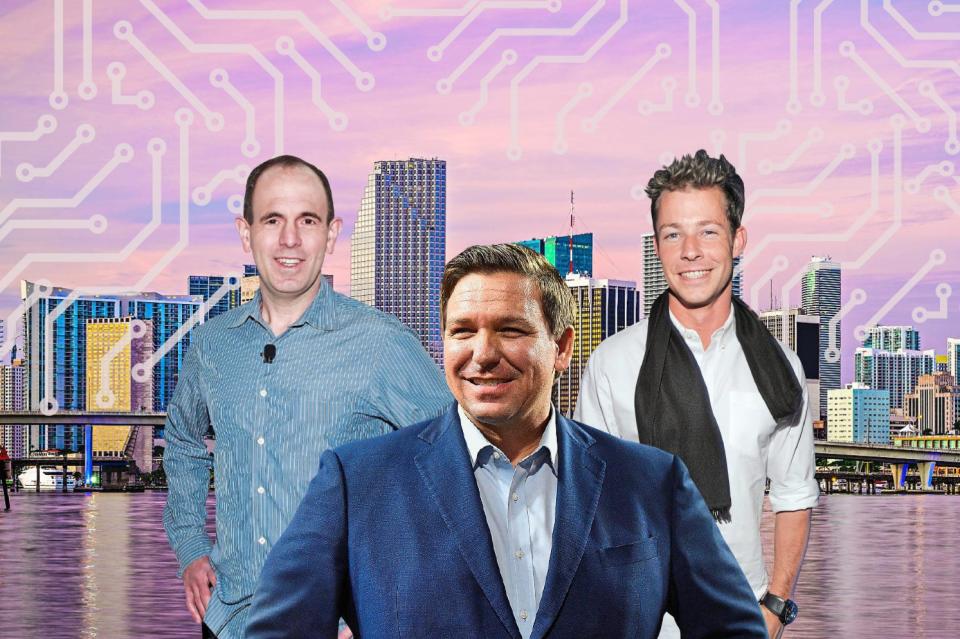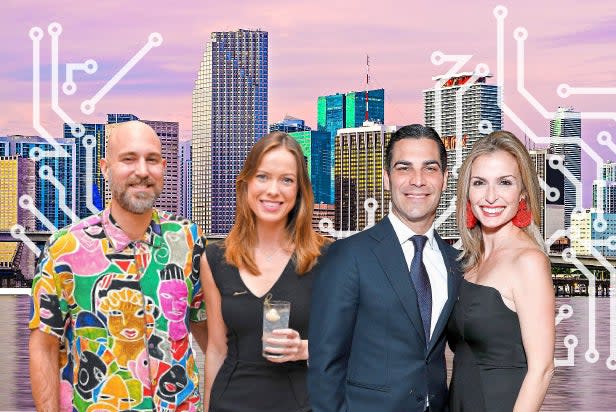Is Miami the new Silicon Valley?

Former LinkedIn executive Keith Rabois, Florida governor Ron DeSantis, and Kallpod’s Steven Barrow Barlow
(Evening Standard)Steven Barrow Barlow, co-founder of Kallpod, a tech solutions company for the hospitality industry, left his house in the Hollywood Hills in December and got on a flight to Florida’s Magic City.
“If someone had told me: ‘You’re moving to Miami’ one year ago, I would never have believed them,” he says. He made the move because he was frustrated that his California clients were forced to shut up shop after a post-Thanksgiving spike in Covid-19. “LA was a challenging environment from both a social and business standpoint. It was intensively regulated compared to most places — the antithesis to Florida”.
Barrow Barlow, an active investor through his newly formed syndicate Andon Okapi Holdings, is a tech refugee — part of the ‘Mass Techxodus’ of talent leaving the West Coast for the Sunshine State. Governor Ron DeSantis’ soft stance on Covid aside, in Florida there is no personal income tax, low corporation tax, the cost of living is less and the quality of life is sky high, with beaches and countless terraces on which to take a meeting over margaritas.
Barrow Barlow bought a 1984 Chrysler LeBaron convertible and started to do socially distanced business. “A lot of conversations that I have are with people like me who thought this was a shorter or medium term move, who are now re-evaluating and thinking, ‘maybe this is long term’. As long as the people are here I think everything else builds out around the talent pool.”
Miami was where business types went to decompress after closing a deal. Not anymore. The Bay Area’s Blue Chip brains have moved in, including PayPal founder Peter Thiel and former LinkedIn and Square executive Keith Rabois. In January, Rabois tweeted: “I have met more new interesting people in Miami in three weeks than all of 2020 in the Bay Area.” Corporate behemoths including The Blackstone Group, SoftBank and Goldman Sachs are scouting for offices, bringing in immense capital right at the gateway to the Central and South American markets. In short, Miami is booming.
But how did once sleepy Miami put one over the valley? Miami’s ambition is writ large across its skyline. With 300 high rises, it is the third tallest city in the US (yet only its seventh most populous) — no mean feat. The spirit of entrepreneurialism has exploded in the last three months, largely due to one man: the Bitcoin-embracing mayor of Miami, Francis Suarez, who in December replied to a suggestion on Twitter that Miami become the next big tech hub with “how can I help?”. He told CNBC the tweet received 2.3 million impressions.
The resident tech community is thrilled with all the tech-tivity. Serial investor Chris Adamo has seen his network grow “exponentially” after Florida lifted a raft of Covid restrictions at the end of September. “I walk down the block from my apartment on South Beach and there are 15 people from VCs and start-ups having coffee; the folks you couldn’t book a meeting with in Silicon Valley or New York. I am having meetings that last year I’d never have thought were possible unless you go to San Francisco and live there for a while. I’m investing in companies that I’d never have found before.”
Adamo — who is an early employee and investor in Letterhead — was able to meet with the new arrivals via the WhatsApp group, Miami Tech Life. By the end of the year, the group had outgrown WhatsApp’s 256-member limit and was forced to migrate to Telegram. It now boasts more than 500 founders, investors and chief executives.

“For people coming here it was like the first day of college. ‘Where will I fit into? Where will I find my friends? You’ve got to find your tribe here and we, the folks who are in tech already living in Miami, became that onboarding ramp.” In biking groups and happy hours, networking is incidental. “It’s the best way... to become friends first, before you become business partners, instead of a stressful environment like a pitch.” According to Adamo, Miami is a “hotbed of health tech, crypto, anything being built on the back end of blockchain… Fintech is a big traditional place for us to head to”.
At the epicentre of Miami’s new network is Demian Bellumio, who started the Miami Tech Life group and was working during Miami’s dot com boom in the late Nineties. He recently left his AI consultancy job, returning to entrepreneur life by launching a mental health telemedicine and psychedelics business, NUE Life Health.
“I’m not a doctor but I am in mental wellness and I understand these people coming from the West Coast, San Francisco mostly, may even be clinically depressed. They are not happy with how the work that they have done has impacted society and the addiction that we have with social media. They want to do something to undo that. Now they are in Miami they want to do something more positive and do something more socially conscious. That was unexpected,” says Bellumio.
What also surprised him is how deal-making has evolved. “Part of my funding round I raised just by putting a message in my group and I got amazing investors who just came into town. Just the in-flow of amazing people that have come in the last six months is unprecedented.” Granted, meetings still happen over drinks at touristy haunts like Soho House, but more often than not they’re taking place mid-activity, such as on a bike ride. “Tech is like a club”, says Bellumio. “We will go cycling and someone says: ‘I’m doing this deal’, and you’ll say, ‘who’s behind it?’ And then, ‘OK, put me in for $50,000 or $100,000’.”
The start-ups Bellumio is most excited about right now are Pipe, which converts companies’ recurring revenues into upfront capital, Eight Sleep’s body-scanning mattresses and SwagUp, which makes branded merch for the likes of Google, Facebook and Coca-Cola. “All these guys could be anywhere but to be here and have the investors around them here, that creates that critical mass that attracts more people like them”.
Suarez knows the West Coast brains could play a vital role in securing its long-term goal of becoming America’s city of the future. Last month he talked to Elon Musk about boring tunnels to ease congestion, a four-year project that had been quoted at $1 billion. Musk undercut them with a $30 million estimate and a time frame of six months.
Adamo agrees: “I think the influx of folks from the West Coast is a net positive for us... they can share what they went through and we can do it right here. These bigger city minds bring a different dynamic that will help the city evolve.”
Read More
Silicon Valley CEO resigns amid furore over footage of him hurling abuse at Asian family
Silicon Valley giants pledge $730m to fight racism as UK firms face pressure

 Yahoo Sport
Yahoo Sport 





































